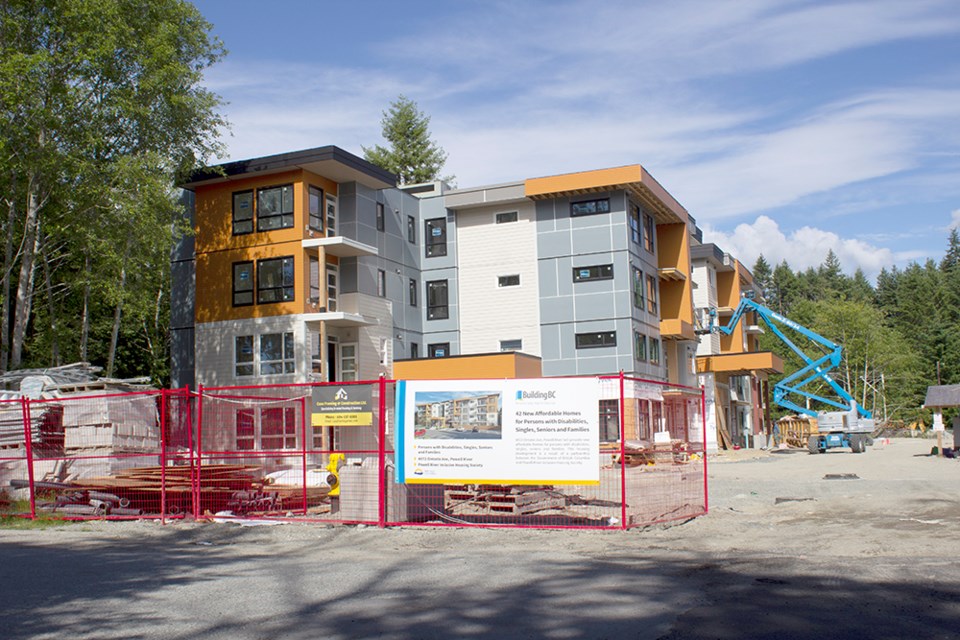Local government representatives have shared their thoughts on hardships faced by struggling renters amid qathet region’s ongoing housing crisis.
In recent articles, the Peak spoke with renters priced out of the local housing market and Lift Community Services homeless prevention outreach worker Carlie Tarlier, who is also a renter, about the lack of affordable accommodations for some of those on income and disability support, as well as those in full-time employment.
These difficulties follow the recent publication of the qathet Regional Housing Needs Report, which gave recommendations to the region’s three local governments, including measures aimed at facilitating the development of more affordable housing supply.
For this week’s article, the Peak talked with City of Powell River councillor Maggie Hathaway, who holds the city’s affordable housing portfolio, about hardships currently faced by local renters.
Housing plan on right track, says councillor
Despite concerns raised about changes in the local market that have occurred in the past few months, Hathaway said she believes the region’s existing housing plan will ultimately take care of the ongoing crisis.
“But if it doesn’t, we are going to move ahead with the recommendations that are in the housing needs assessment,” added Hathaway.
The housing needs report noted its findings are limited by the fact that it is based on five-year old census data, and by significant market changes that have occurred during the coronavirus pandemic, which, the report stated, were not quantifiable at the time of publication.
A significant increase in local house prices is motivating some landlords to sell, according to Tarlier, displacing renters who then cannot find alternative accommodation at an affordable rate.
Asked about those concerns, Hathaway said she believes seniors selling their homes and moving into the new Coastal Breeze independent living facility might also be driving some of the recent sales figures.
“It’s not all people from out of town who are buying, there’s lots of people locally, so that establishment will free up a lot of family housing, which is needed,” said Hathaway. “It’s going to start slowing down pretty soon.”
Coastal Breeze operates 76 independent living units.
According to monthly sales figures for 2021, 154 residential units have been sold in the region since January.
Out-of-town buyer ratio increases
In March, Powell River Sunshine Coast Real Estate Board director Lyn Adamson told qathet Regional District directors that sales to out-of-town buyers had increased by three per cent to 55 per cent of all buyers in 2020. Adamson said that increase might not seem statistically significant, but still amounts to a substantial influx of out-of-town buyers.
Asked about immediate challenges faced by renters who cannot find an affordable place to stay, Hathaway said she works closely with BC Housing, which has provided supportive housing over the past two years, and Lift. Hathaway said both organizations have worked to shelter unhoused people in motels during the pandemic.
“My fear is when COVID is over, what happens?” she added.
In total, Hathaway said there will be 144 units of supportive housing at “truly affordable” rates - defined as costing no more than 30 per cent of one’s income - on the books within the year.
“We have things pretty well in hand and we’re on top of it,” said Hathaway. “The nonprofits are amazing; they just do fantastic work, and I’m forever grateful for the work they do in keeping low-income people housed in usually adequate housing.”
According to Tarlier, however, some housing developments defined as “affordable,” such as the apartment building at Ontario Avenue, will charge rents that are more expensive than some people on low incomes can actually afford.
Local housing authority an option
More broadly, Hathaway said she thinks it is best if the region’s overall needed housing supply is built by private-sector developers, but that the city might consider creating a local housing authority if sufficient numbers of new units are not forthcoming.
“We really haven’t gotten into the details,” added Hathaway. “It’s kind of our next step if needed, because I’m not convinced we need to go that route.”
It is not clear what form a local housing authority would take, but Hathaway said it would potentially involve the city becoming the landlord of a property, which might then be run by either city employees or (more likely) local nonprofits.
“I’m hoping with all the building that’s going on here that there will be available housing,” added Hathaway. “There’s just new houses going up everywhere.”
Hathaway also noted that a 141-unit apartment building proposed on Edgehill Crescent by Veyron Properties Group will include 10 units with reduced rents for 10 years. During an April meeting, council heard the units would be “affordable” based on 30 per cent of income.
However, during the June 1 committee of the whole meeting, council heard that the developer is in fact offering units at reduced rates based on a dollar amount - just over $900 per month. As well, mayor Dave Formosa stressed that the units are only cheaper because they are smaller, not because the developer is offering to forego any returns on their investment.
Formosa and city councillors, including Hathaway, said they had hoped for more than 10 units, and at a truly affordable rate. Hathaway added that the 10-year limitation period was also a concern.
“We have now been told that under the zoning they are not required to provide an affordable housing offer, but they have volunteered this offer, which does not exactly meet the city’s guidelines for affordable housing,” Hathaway told the Peak. “We have referred this application from committee of the whole to council for further debate. Mr. [Jason] Gow, the director of planning, will be bringing us some type of standardized agreement to look at at that time.”
For the upcoming fourth article in this series, the Peak spoke with qathet Regional District director Mark Gisborne, who voted against the housing needs report, and believes a different approach to housing in the region is required.



